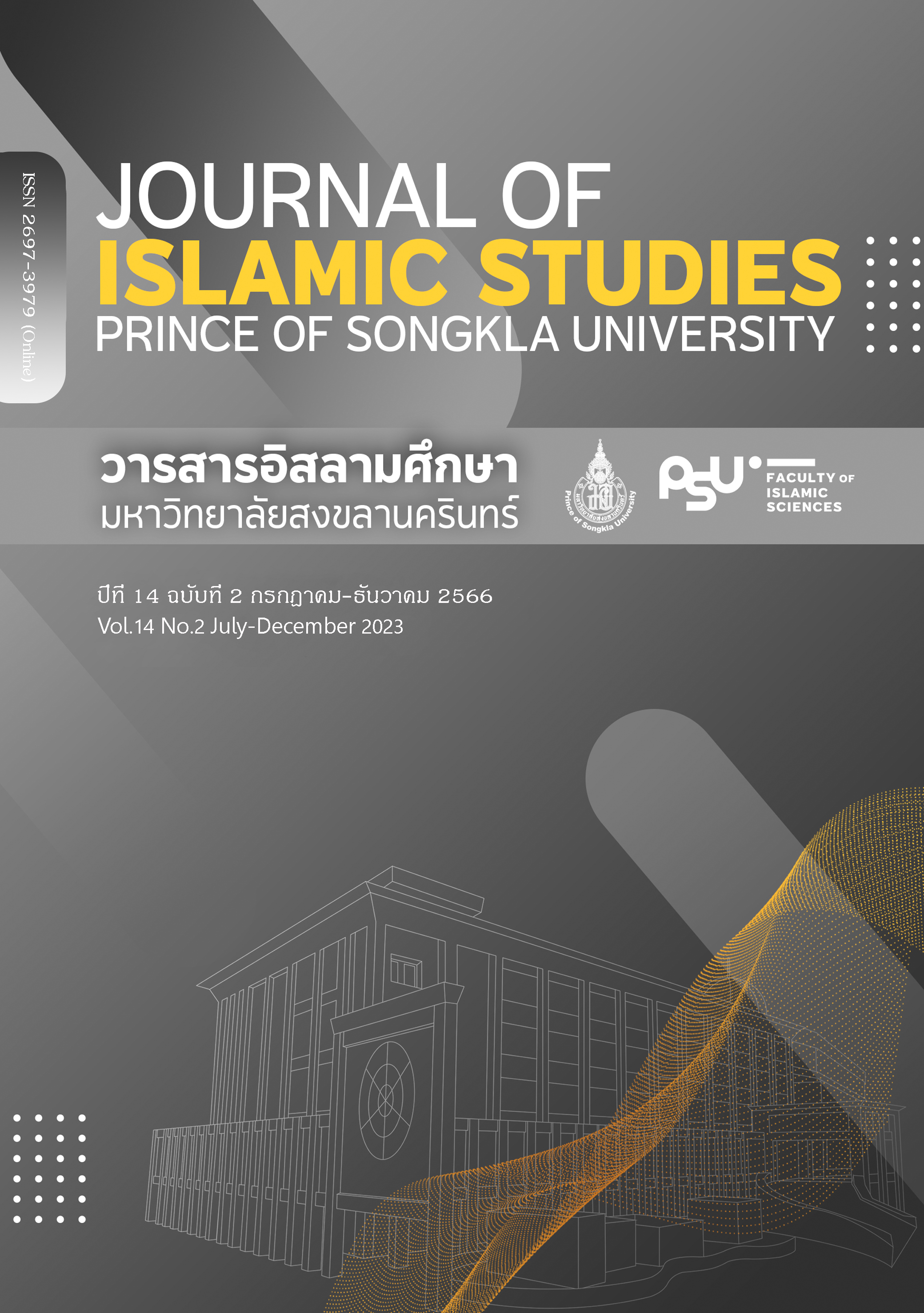A Structural Equation Model of Inquiry Learning for Mathayomsuksa 4 Students in Private Islamic Schools, Yala Province
Keywords:
Structural Equation Model, inquiry learning characteristicsAbstract
Objective 1) To develop and verify the validity of the structural equation model of factors affecting the inquiry learning for Mathayomsuksa 4 students and 2) to study the influence size of the structural equation model of factors affecting the inquiry learning for Mathayomsuksa 4 students.
Methodology This research involves quantitative analysis and focuses on a sample comprising 165 students currently enrolled in Mathayomsuksa 4 at the Private Islamic Schools in Yala Province. The sample was selected using the stratified sampling method. The data were gathered through a questionnaire consisting of three sections: 1) general information 2) self-assessment of inquiry learning characteristics; and 3) factors influencing inquiry learning characteristics, namely, personal, teacher-related, and environmental factors. The data analysis utilized descriptive statistics, correlation coefficients, and Structural Equation Model analysis (SEM).
Research finding 1) The model was consistent with empirical data considering the values = 68.17, df = 52, = /df= 1.31, GFI = 0.94, AGFI=0.892 and RMR = 0.031. The model accounted for 95% of the variance in inquiry learning among Mathayomsuksa 4 students 2) The factors exerting the most substantial direct influence on the inquiry learning characteristics of MathayomSuksa 4 students in Private Islamic Schools were personal factors.
Contributions Regarding individuals, the research results reveal that aspirations for the future are a significant factor influencing the highest levels of inquiry learning characteristics among students. Therefore, parents, teachers and school administrators should foster students' self-worth and pride in their existing competencies. Concerning educators, stimulating analytical thinking processes emerges as a critical factor impacting the higher level of inquiry learning characteristics of students. Hence, educators should promote instructional activities that stimulate learners to enhance their analytical thinking skills. In terms of the learning environment, the research findings indicate that psychological aspects significantly affect the highest levels of inquiry learning characteristics among students. Hence, parents, teachers and school administrators should encourage students to maintain a positive mental state, view the world optimistically, and maintain a mindset conducive to continuous learning throughout their academic journey.
References
Aiemkongsri, S. (2018). Classroom Management in the 21st Century. Triple Education Co., Ltd.
Candy, P C, Crebert, R G & O’Leary, J O (1994). Developing Lifelong Learners through undergraduate education. National Board of Employment.
ChanYang, T. (2017). A Relationships of Factors Affecting Learning Behaviors of Mathayomsuksa2 Students School's case study. Journal of Educational Measurement, 34 (95), 47-58.
Hair, J. F., Black, W. C., Babin, B. J., & Anderson, R. E. (2010). Multivariate Data Analysis. (7 thed.). Pearson
Laejai, K. (2012). An Analysis on Multistage Factors Affecting the Eager to Learn Attributes of ParathomSuksa 6 Hill-Tribe Students from Schools Under the Office of Chiangrai Education Service Area 3. Master of Education (Educational Research and Evaluation) .Chiangrai Rajabhat University, 94-96.
Lohma A. (2023). 10 February 2023. Teacher at Private Islamic School, Yala Province. Interview.
Lumsden,L.S. (2516). Student Motivation to Learn. Retrieved from: www//ericdigests.org/1995-1/learn.Hrm.
Ministry of Education. (2008). Basic Education Core Curriculum (B.E. 2008). Printing Press of The Agricultural Co-operative Federation of Thailand, Ltd.
Nunwong, N. (2565). An analysis of factors affecting mathematics learning attention of upper secondary school students. Journal of Educational Measurement, 39(105), 128-129.
Office of the Education Council. (2017). Thailand Education Scheme in Brief (2017-2036). Prikwan Draphic. Co., Ltd.
Poonasron, S. Kusalacitto, W. Wannavong, K., & Audmuangpiea, S. (2022). The Development of a Peason for the Learning in The 21stCentury. Journal of MCU Ubon Review, 7(1), 107-108.
Rimcharoen, N. (2563). Enhancement of Academic of High School Student by Using Guidance Activities. Master of Education (Guidance Psychology). Faculty of Education, Srinakharinwirot University, 3-4.
Thai Publica. (2022). Online from https://thaipublica.org/2022/12/nida-sustainable-move10/.
Thanyutto, S. (2009). Application of Buddhist Principles in Moral Development of Students at Khukhan Ratbamrung School, Khukhan District, Sisaket Province. Journal of MCU Ubon, 7(3). 44-45.
Ueangchokchai, C. Chomuan, N., & Tanthawudho, V. (2016). The Characteristics of Lifelong Learners for Thai Youth. Journal of Education Studies, 44(4), 66-68.
Yindeesuk, S. (2016). The Analysis of Factors Affecting Curiosity and Guidelines to Developing Curiosity of Secondary School Students. Journal of Education Studies, 46(2).
Downloads
Published
How to Cite
Issue
Section
License
Copyright (c) 2023 © The Author(s). Published by the Journal of Islamic Studies, Prince of Songkla University under the Creative Commons Attribution 4.0 International License.

This work is licensed under a Creative Commons Attribution 4.0 International License.
All articles Published in The Journal of Islamic Studies are author’s opinions, and not the responsibility of the Faculty of Islamic Sciences nor the editorial board. However any citation should be referred to the journal.
















